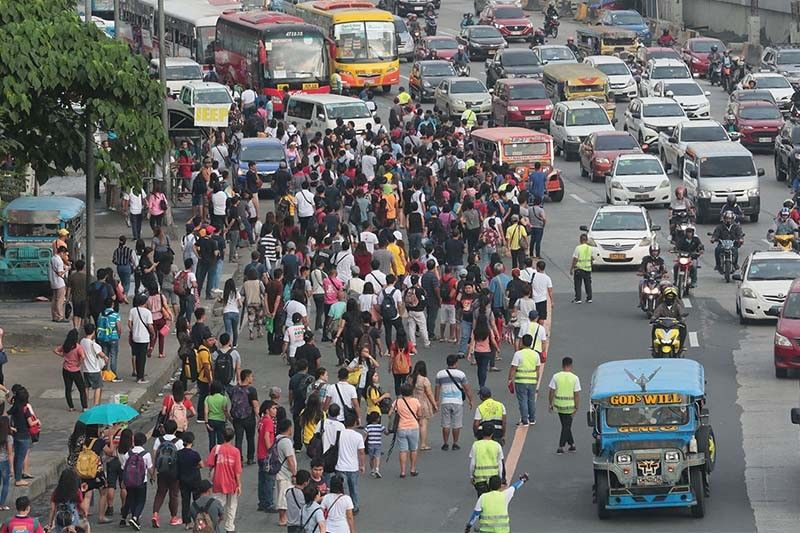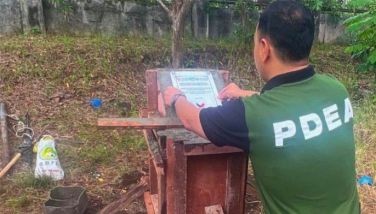Workers group hits government lack of transpo plan

MANILA, Philippines — Workers group Kilusang Mayo Uno in a news release on October 8 said they blame the current transportation crisis on what they said was "the government’s lack of interest and will to formulate a central plan for a state-run mass transportation."
This comes a day after BAYAN Secretary General Renato Reyes Jr. Monday said that the mass transportation situation in the country was in crisis after all three of the mass transit systems in Metro Manila broke down in the span of a week.
“The government is geared to privatize modes of mass transportation, instead of coming up with a comprehensive plan to address the need for an efficient mass transportation in Metro Manila,” said KMU Secretary-General Jerome Adonis.
"It is occupied with selling out our mass transportation system to big businesses instead of running it as public servce."
“The government should always take into primary consideration public interest when it comes to transportation: Is mass transportation accessible and affordable for the commuters? Do we have an efficient transportation system that would benefit both the commuters and the economy?” Adonis pointed out.
KMU also blamed the lack of an efficient mass transportation system for the severe traffic situation in the Metro. “A privatized and anarchic transportation driven by profits of big businesses would only result in heavier traffic,” Adonis said.
According to a 2000 study by UN-HABITAT, although the privatization of public transportation in Manila came with its own benefits and alleviated allocation concerns, the shift "has also produced an environment of seemingly free-for-all competition, contributing to chaos and congestion on the road."
“Only an efficient state-owned and state-run mass transportation will address the transport crisis. Transportation should always be rendered as public service and not business for private profits,” Adonis concluded.
Traffic congestion data from the MMDA showed that as of 2018, EDSA carried an average of 402,000 vehicles each day, far exceeding its carrying capacity of 288,000 vehicles. Figures from the Japan International Cooperation Agency on the same year said that traffic congestion now costs the country P3.5 billion in lost opportunities per day.
The LRT-1 and LRT-2 systems in the country are owned by the government, Philippine National Railways, while the MRT-3 is privately-owned by the Metro Rail Transit Corporation.
Electric and technical glitches on October 2 caused the MRT-3 and LRT-1 operations to halt resulting in some 500 passengers being offloaded. The succeeding day, the LRT-2's power rectifier in between the Katipunan and Anonas stations caught fire, effectively crippling both stations along with the Santolan Station.
A 2015 statistic showed that the average daily ridership of both LRT lines totalled to 760,000 passengers. The MRT-3 on the other hand serviced 463,000 passengers daily in 2017.
“We would like to know why there is no inventory of spare parts for the train system. Nine months of partial operations of LRT-2 will heavily impact commuters, especially workers and students,” pressed Adonis.
KMU's statement comes as the latest in a recent flood of public outcry regarding the transportation system. On September 30, transport groups held a nationwide transport strike to protest the PUV modernization program which looks to phase out all jeeps that are at least 15 years old and replace them with Euro 4-compliant vehicles running on renewable energy.
Each PUV unit's cost, however, ranges from P1 million to P2.2 million.
The same report by UN-HABITAT called jeeps a "mainstay of the city’s transportation system," citing the statistic that they are responsible for "carrying around 40 percent of all passenger trips."
"Hindi pa ba ito [iimbestigahan] ng Senado? Kamusta ang budget ng mga ahensya?" Reyes sounded off on his personal Twitter account.
"Malungkot, pero yan ang nalilikha ng ganitong mga kundisyon sa kakulangan ng mass transport."
- Latest
- Trending






























